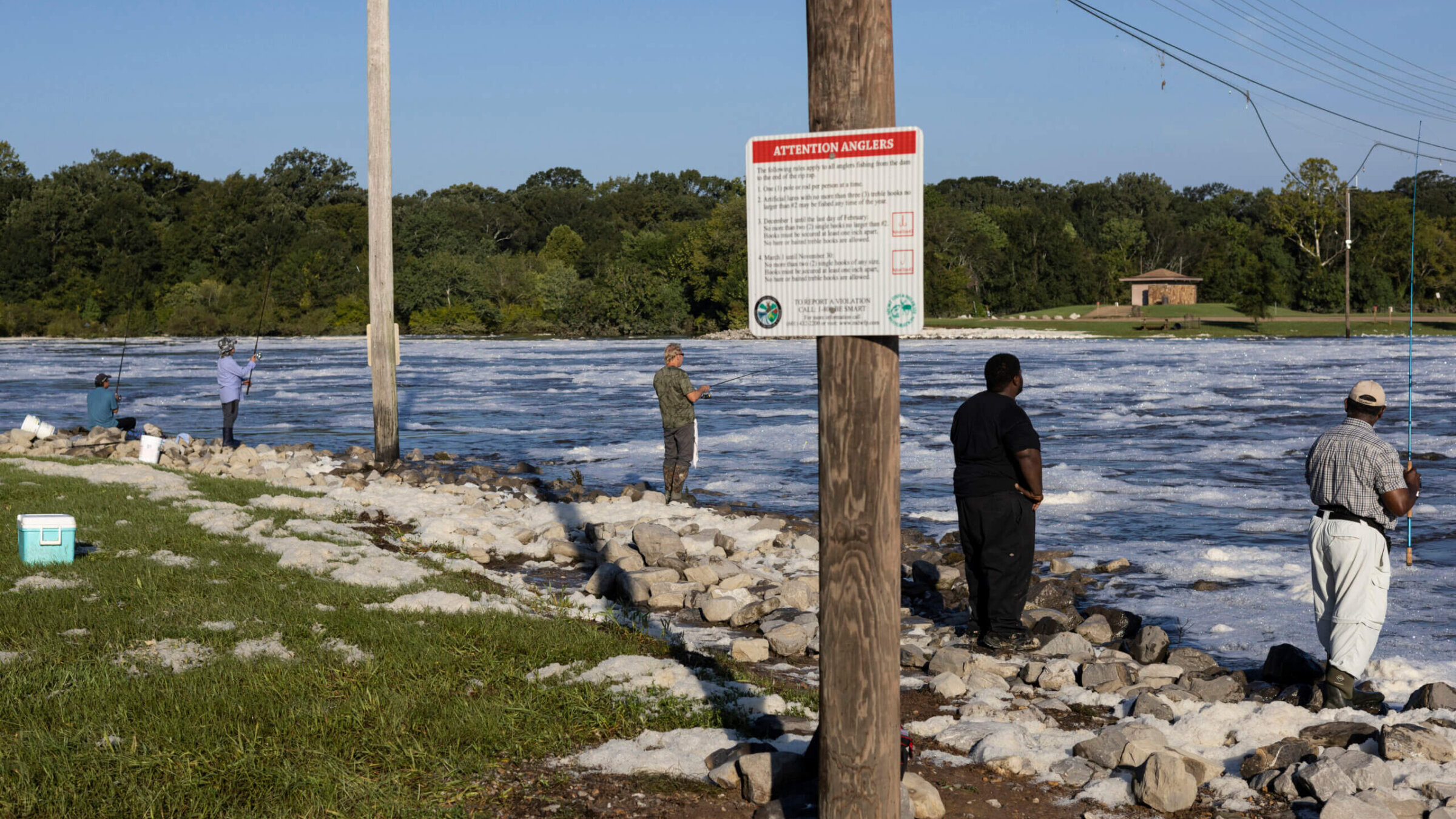Amid water crisis, the only synagogue in Jackson, Mississippi, makes bat mitzvah disaster plans
As residents of Jackson must boil all running water for safety, the Jewish community continues to hold services

People fish in the flooded Pearl River on August 31, 2022 in Jackson, Mississippi. Photo by Brad Vest/Getty Images
There will be a bat mitzvah this Saturday at Beth Israel Congregation, the only synagogue in Jackson, Mississippi.
But as the city grapples with climate catastrophe and collapsing infrastructure, with its water systems failing in the wake of extreme flooding, the ceremony will look a little different than most rituals at the 170-family synagogue.
“I went and grabbed drinking water for the families and guests at the bat mitzvah, as well as in case of our congregants needing any,” said Rabbi Joseph Rosen.
Extreme weather events have become something of a norm in Jackson, which helps explain why the recent flooding of the Pearl River led to such devastating results. Before this week’s floods, the city had not yet recovered from major flooding that inflicted massive infrastructural damage in February 2020. That damage laid the groundwork for the blow to the city’s water systems this week — a crisis that has captured the nation’s attention as an example of what living with the effects of climate change can look like.
For Beth Israel, that means new support systems and precautions within the synagogue community, and new efforts to aid neighbors outside of it.
Rosen’s top priority at the moment: “Just making sure that there are workable bathrooms and drinking water for folks who need them.” Thinking ahead to the bat mitzvah, he’s working to prepare for additional disasters. “If, for some reason” guests encounter issues, say, at their hotels, he said, his hope is that “we’re able to respond.”
Beth Israel, a Reform community founded in 1960, is situated on the north side of the city, which has been less severely affected by floods than other areas. It’s stepping up aid efforts for South Jackson, which is facing greater strains. As a first step, Rosen helped purchase water and delivered it to a Black church in South Jackson.
Shira Muroff, a member of the congregation who has lived in Jackson for six years, said that her water pressure is high, because she lives fairly close to the city’s water treatment plant. “If you’re further away you have less running water or none at all,” she said, adding that “those are also the areas that are statistically lower socioeconomic status.”
Both Rosen and Muroff said that they and their community have felt the impact of Jackson’s increasing natural disasters in recent years. The current water-boiling notice, a precaution to ensure the safety of drinking water when treatment facilities are compromised, has been in effect for over one month. In February 2021, the large winter storm that shut down power for millions of Texans also heavily impacted Jackson.
“The whole city was under a ‘boil water’ notice. There were residents in Jackson who waited over a month for the ‘boil water’ notice to be lifted,” Rosen said. “We saw pictures and heard stories of people scooping up snow from their yard.”
“After last winter’s debacle, many in our community had hoped to see that the city and the state would be working together to avoid this kind of disaster again, and yet, here we are, again,” Rosen said.
But in the age-old way of Jewish communities, Beth Israel is attempting to take its new normal in stride. The congregation plans to hold normal High Holiday services, even if the “boil water” notice is still in effect. If so, the synagogue will have to stock up on bottled water to put in watercoolers for congregants, since they cannot use tap water. “If this affects our ability to have a meal in the congregation, we’d either have to move to disposables, or other creative options,” Rosen said.
For the moment, the synagogue’s focus is staying trained on the parts of Jackson facing greater water scarcity, Muroff said.
“The main thing that we’re trying to advocate for is just getting water to folks who need it right now.”
A message from our Publisher & CEO Rachel Fishman Feddersen

I hope you appreciated this article. Before you go, I’d like to ask you to please support the Forward’s award-winning, nonprofit journalism so that we can be prepared for whatever news 2025 brings.
At a time when other newsrooms are closing or cutting back, the Forward has removed its paywall and invested additional resources to report on the ground from Israel and around the U.S. on the impact of the war, rising antisemitism and polarized discourse.
Readers like you make it all possible. Support our work by becoming a Forward Member and connect with our journalism and your community.
— Rachel Fishman Feddersen, Publisher and CEO




























